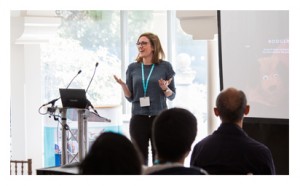Students from the Centre for Digital Entertainment (CDE) took part in a two-day Research Jam to put their skills to the test to create apps or games with the purpose of enhancing the work of Bournemouth University Dementia Institute (BUDI).
The Centre for Digital Entertainment is a centre for doctoral training and collaboration between the universities of Bournemouth and Bath, funded by the Engineering and Physical Sciences Research Council (EPSRC).
The intention of this year’s CDE annual event, also attended by academics and industry professionals, was to bring the focus back to the skills and knowledge the CDE Research Engineers are gaining during the four year programme, and inputting it into a creative process that could benefit society.
 Professor Jian Jun Zhang, Deputy Director of CDE at Bournemouth University, said, “This year we wanted to push our students a little harder and by using their expertise and teaming up with BUDI, we hope to have a societal impact through the work we are doing”.
Professor Jian Jun Zhang, Deputy Director of CDE at Bournemouth University, said, “This year we wanted to push our students a little harder and by using their expertise and teaming up with BUDI, we hope to have a societal impact through the work we are doing”.
The two day event, which took place in the beautiful Italian Villa, included a talk from the BBC’s Research and Development department and Dementia Friends training from BUDI, before students were split into groups and each asked to create an app, game or interface that would either raise awareness for, or assist people with dementia.
An integral part of the programme is the three year industrial placement. Ian Stephenson, a Senior Lecturer in Computer Animation and part of the CDE, said, “These postgraduate students have been working in companies like the BBC and Double Negative, once a year we bring them together. This year we have partnered with BUDI to look at the topic of dementia. We want these young engineers to build something that addresses the issue of dementia in society – to put their technical skills to use for the benefit of society.”
The event started with presentations from the BBC’s Research and Development (R&D) department and Bournemouth-based company 3 Sided Cube, giving the students an insight into work processes around digital content creation before the teams got to work. After seeing the presentations and collating information, the teams had a little under 24 hours to research, create and present their ideas.
The teams were asked to work on one of three main areas within the theme of dementia; physical stimulation to keep people with dementia active; social stimulation to increase interaction, and generational interaction, for people with dementia; or a piece of technology to challenge public view of dementia.
 Becky Gregory-Clarke (pictured) from the BBC’s R&D team said, “The BBC R&D team has a strong link with the CDE through student placements and we’ve been ‘workshopping’ around the idea of dementia too, so it was great to come along and see these students at work. It’s really great for students to get involved in events like this because at the BBC we do things like this as a part of our work day too, so if you can get used to brainstorming and working like this now it can really hold you in good stead for your career in the future too.”
Becky Gregory-Clarke (pictured) from the BBC’s R&D team said, “The BBC R&D team has a strong link with the CDE through student placements and we’ve been ‘workshopping’ around the idea of dementia too, so it was great to come along and see these students at work. It’s really great for students to get involved in events like this because at the BBC we do things like this as a part of our work day too, so if you can get used to brainstorming and working like this now it can really hold you in good stead for your career in the future too.”











 Conversation article: London Marathon – how visually impaired people run
Conversation article: London Marathon – how visually impaired people run Horizon Europe News – December 2023
Horizon Europe News – December 2023